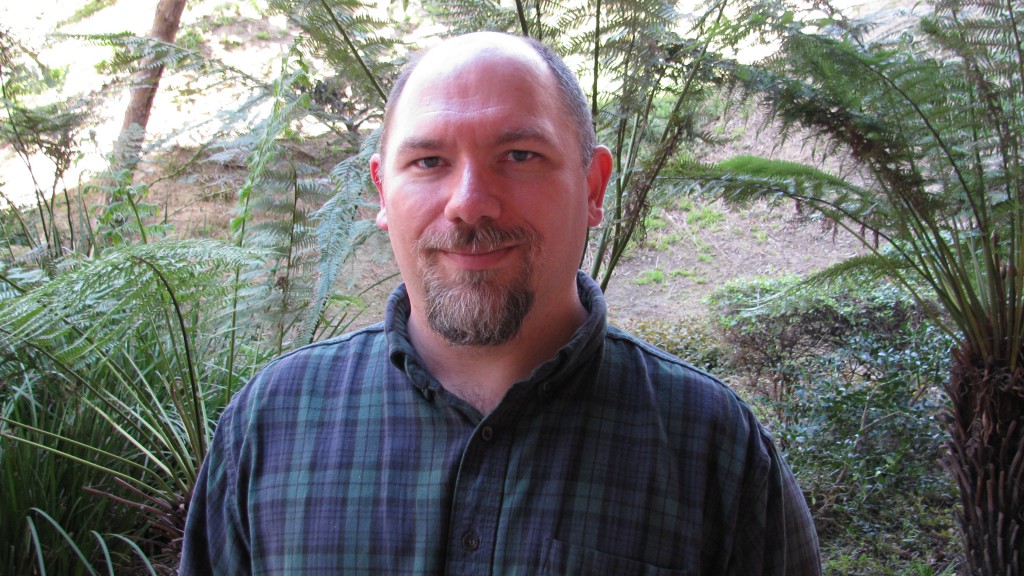Through his work with ant societies in the rainforest, associate professor of biology Dr. Terry McGlynn has been able to show students the benefits of altruism within a species, in the hopes of teaching them about more than just insect behavior.
“In a way, social insects are the pinnacle of evolution,” says McGlynn, who is this year’s winner of the Excellence in Research, Scholarship, and Creative Activity Award. “There’s this popular image that in insect colonies, individuals sacrifice themselves for the whole. But social insects are animals, just like we are. It is more often that it is in their [individual] interest to work for the benefit of the group.

“In social insect colonies, where everyone is at some level, related or vaguely familiar with one another, when everyone joins together to perform altruism, then individual benefits are greater than if they didn’t,” McGlynn notes. “As human societies are becoming more closely linked to one another, then you would expect that the benefits of altruism would grow.”
Having focused his studies of tropical ecology, detrital food webs, and behavioral and community ecology on rainforest ants, McGlynn says that this group of animals affords researchers the ability to gain insights into many aspects of biology that in other types of organisms would be harder to isolate.
“From an ecological perspective, ants are just cool because they’re everywhere, especially when you go to the rainforest, they make things run,” he says. “And also, there is tremendous biological diversity: leafcutter ants, army ants, bullet ants. It’s rare that you find one group of organisms that interact with so many other types or organisms in so many ways, so it’s a useful model system.”
Soon after his arrival at California State University, Dominguez Hills in 2007, McGlynn began to invite students to take part in his Tropical Ecology Mentorship Program of Southern California at the La Selva Biological Station in northeastern Costa Rica. The program, which is supported by the National Science Foundation (NSF) and the university’s Louis Stokes Alliances for Minority Participation (LSAMP), has given undergraduates a head start on acquiring research and fieldwork experience. He looks forward to expanding the program to include students from El Camino College in the future.
“It’s really hard to be a successful researcher while being a full-time student if you only do [research] for a year,” says McGlynn. “The idea is that we can identify motivated and talented students early on, because if you do your undergraduate research from the time you begin [college], then you can have tremendous success by the time you graduate.”
McGlynn earned his bachelor’s degree in biology at Occidental College and his doctorate in environmental, populaton, and organismic biology at the University of Colorado. He completed his postdoctoral studies at the University of Houston on the population biology of fire ants. McGlynn has taught at the University of San Diego, and Gettysburg College, and served as a research associate at the San Diego Natural History Museum from 2005 to 2008. Additionally, he has been a research associate at Occidental College since 2007.
McGlynn’s committee work at CSU Dominguez Hills includes service on the University Committee on Educator Preparation, the university’s task force on marketing, the Faculty Research Advisory Council, and the Biology Department Curriculum Committee. An enthusiastic mentor for K-12 science teachers, McGlynn coordinates the university’s Noyce Master Teacher Fellowship Initiative, which is supported by NSF,,and has participated in supervising international research experiences for teachers in the Los Angeles Unified School District.
McGlynn is currently president of the North American section of the International Union for the Study of Social Insects, and in 1999, received the organization’s George C. Eickwort Student Research Award. He has written many articles in peer-reviewed research and teaching journals, including “Global diversity in light of climate change: the case of ants” for Diversity and Distributions; “More individuals but fewer species – Tests of the more individuals hypothesis from experiments on a diverse tropical fauna” for Biology Letters; and “Effects of biogeography on community diversity” for Nature Education Knowledge. He serves on the editorial board of the journal Biotropica.
McGlynn says that he is impressed by the level of intellectual curiosity that science students at CSU Dominguez Hills display in his classes.
“There’s a genuine interest in acquiring knowledge,” he says. “Almost no one in the middle of a class would ask me, ‘Is this going to be on the test?’”
McGlynn, who entwines his experiences as a researcher with his ability as a teacher, says that he strives to relate to his students, many of whom are discovering the depth of the sciences for the first time.
“To teach well, you have to understand what it’s like to not understand something,” he says. “An expert cannot explain something well to a novice, there is an [understanding] gap. As long as you are doing research, you are always going to be a novice, because you don’t have all of the answers. So even though I might be teaching something I am familiar with, I can relate back to the time when I didn’t have all the answers.”